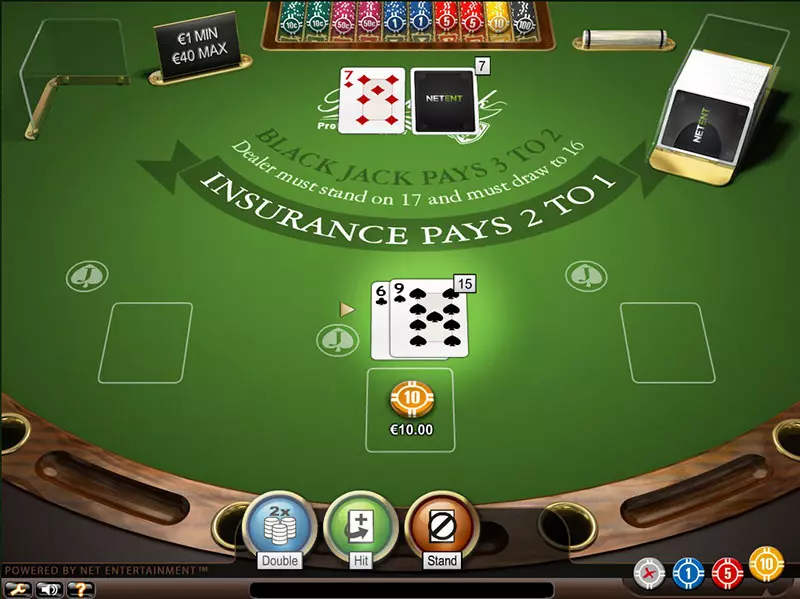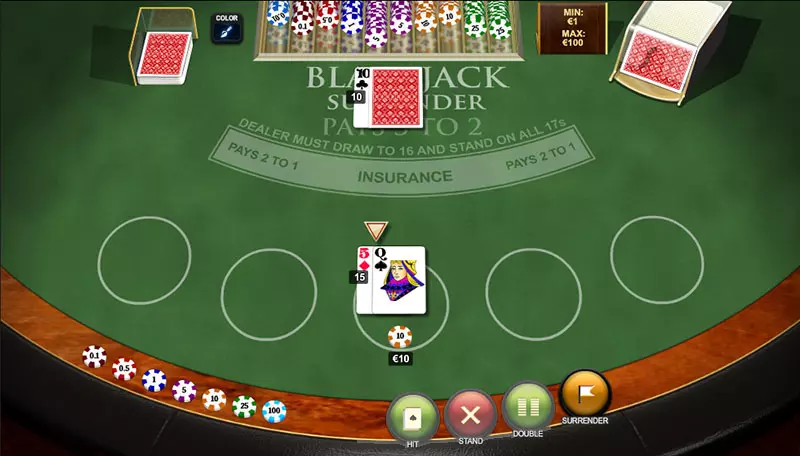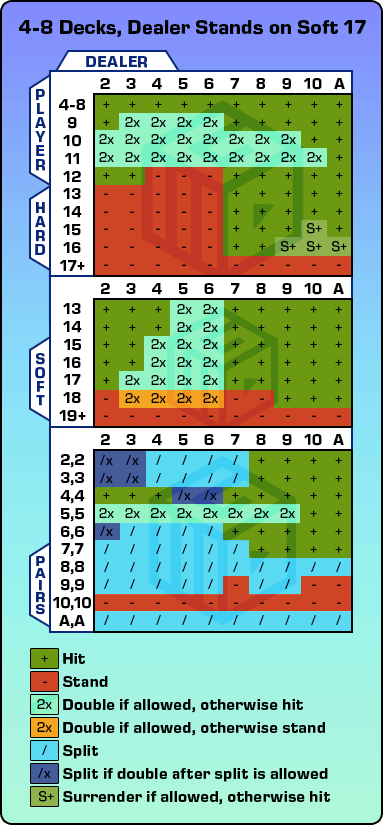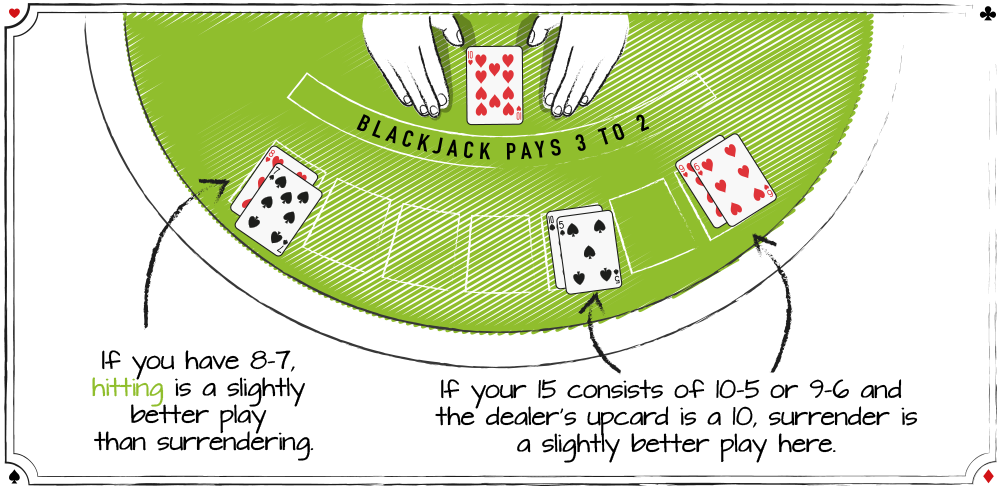Should you hit at 15 blackjack. Novedad aquí - When playing blackjack should you hit on 15
 Question: “When should I hit on my 15” Sam says: “Always hit a hard 15 when the dealer's up-card is a 7 through an ace. If you stand on that 15, you will win 25.36 percent of the time and lose 74.64 percent of the time. That makes a net loss of 49.28 percent.
Question: “When should I hit on my 15” Sam says: “Always hit a hard 15 when the dealer's up-card is a 7 through an ace. If you stand on that 15, you will win 25.36 percent of the time and lose 74.64 percent of the time. That makes a net loss of 49.28 percent.In a double- or multi-deck game, if your 15 consists of an 8-7, hit against a dealer 10 upcard (rather than surrender). In all games, if your 16 is multi-card or the result of a pair split, stand against a dealer's 10 upcard instead of hit.
It is best to hit when holding a hand of 10 or 12-16, and stand on anything 17 and over. An ace gives you a good chance of making 21 with a hit. When a dealer has a seven, eight or nine card it is impossible for them to make a blackjack, so your chances increase.
You should stand on all totals of 17, 19, or 20. You gain nothing from taking another card, regardless of what the dealer has. You don't want to go bust. Watch out for good totals that can be split.
What are the odds of busting on 15
58% Hit on 15 = 58% chance of busting. Hit on 14 = 56% chance of busting. Hit on 13 = 39% chance of busting.Should I always double down on 11
For most people, particularly those who are newer to blackjack, it's almost always a good idea to double down when you are showing an 11.When gamblers find themselves in a situation where their hand totals 13 and the dealer's upcard is from 2 through 6, they should stand. For the rest of the possibilities of the dealer's upcard, players need to hit, i.e. against stronger cards 7 through ace.
On all your two-card hard 16s, you gain by hitting whenever the dealer has 7 or higher, but the gain is biggest when the dealer has a 7 up. There are some hands of three or more cards where it's a better play to stand on 16 vs. 10, but that gets us into composition-dependent strategies — a topic for another time.Why hit 16 against 7
The fact is that no matter what you do with a hard 16 against a dealer's 7, you're going to lose more often than you win. If you hit, you're going to bust a little more than 61 percent of the time. If you stand, you're going to lose those 74 percent of hands when the dealer goes on to make a standing hand.
Purely based on statistics, some casino gamblers get lucky and win money. Blackjack, however, can be beaten based on skill—no luck involved.
If it's good enough for the dealer, it's the same for players … hitting soft 17 is always better than standing. Therefore, one of the golden rules of smart play is this: No matter what blackjack game you are playing, never stand on soft 17.Blackjack: When to hit Ultimately, the game's main aim is to beat the dealer's hand. While it's not advised, some players choose to hit when they have a hand total of 12 or 13 and the dealer has a lower card. That hand is very unlikely to win but it just might, depending on what card you'll draw next.
Blackjack Etiquette - Do's and Don'ts1 Don't hand your money to the dealer.2 Never hold your cards with two hands.3 Never remove your cards from the table.4 Never touch your chips once the dealer calls "no more bets".5 When the cards are dealt face up, don't touch them.6 Signal your decision, don't say it.Given a common six-deck game in which dealers hit soft 17, basic strategy tables tell you to double down with hard 11 against any dealer up card; on hard 10 when the dealer has any up card from 2 through 9; or on hard 9 when the dealer shows a 3, 4, 5 or 6.
Do you hit a 15 against a 2
15 stands against dealer 2 through 6, otherwise hit. 14 stands against dealer 2 through 6, otherwise hit. 13 stands against dealer 2 through 6, otherwise hit.You hit and draw an ace giving you a soft 17 (2-4-A). The playing rules in most land-based and online casinos prohibit you from doubling down on a hand once you draw a third card; therefore, if you hold a multi-card soft 17, you should hit.Traditional basic strategy (also known as “total-dependent strategy”) says to stand on hard 12 against a dealer's 4, 5, and 6 up card, and hit against a dealer's 2, 3, and 7 though Ace up card. The biggest mistake that players make when they are dealt a hard 12 occurs when the dealer's up card is a 2 or 3.STRATEGY #1: ALWAYS DOUBLE DOWN ON A HARD 11.STRATEGY #2: ALWAYS SPLIT A PAIR OF 8s AND ACES.STRATEGY #3: NEVER SPLIT A PAIR OF 5s OR TENS.STRATEGY #4: ALWAYS HIT A HARD 12 AGAINST A DEALER'S 2 OR 3 UPCARD.STRATEGY #6: ALWAYS DOUBLE DOWN ON 10 WHEN THE DEALER'S UPCARD IS 9 OR LESS.For most people, particularly those who are newer to blackjack, it's almost always a good idea to double down when you are showing an 11.
Do you hit a soft 17 vs 6
Now you've got a 2-4-ace or a soft 17 hand. Bingo, you remember the rule that you should double down on soft 17 when dealer shows a 6. But hold on here. In most land-based and online casinos, the casino rules prohibit doubling down on a hand once you draw a third card.You're also likely going to bust when you decide to hit. However, you'll lose about 74% of the time, which is 3% less than standing. This means should be hitting every hand for 16 vs. 10 in blackjack because this is the action that produces better results in the long term.
If you split the 10s one time, you stand to win 63% and lose 37% on each split hand. That's a significant decrease in the number of hands won simply because if you split, you will often end up with less than 20 on both hands.
You should split against a dealer's upcard of 2-7. Hit against a dealer 8 and 9 upcard. Surrender against a dealer 10 and Ace if allowed, otherwise stand against a 10, and hit against an Ace.RE-SPLITTING 10S When playing live blackjack against the dealer, most casual players split 10s when he has a weak upcard like a 5 or 6 (although I have seen many players during my career split 10s no matter what the dealer shows). 17 and up always stands. 16 stands against dealer 2 through 6, otherwise hit. 15 stands against dealer 2 through 6, otherwise hit.
17 and up always stands. 16 stands against dealer 2 through 6, otherwise hit. 15 stands against dealer 2 through 6, otherwise hit.
Similar articles
- ¿Quién ganó León Tigres hoy. Novedad aquí - ¿Cómo quedó Tigres en el partido de hoy
- ¿Cómo conseguir tú freebet de Codere. Novedad aquí - ¿Cómo activar free bet Codere
- ¿Cuántos puntos tiene el Valencia. Novedad aquí - ¿Cómo ba la tabla de la liga española
- ¿Cuántas finales ha ganado Tigres Femenil. Novedad aquí - ¿Cuántas veces ha sido campeón Tigres femenil
- ¿Quién perdió el penal en Colo Colo. Novedad aquí - ¿Quién se perdió el penal en Colo Colo
- ¿Cómo hacer un KPI paso a paso. Novedad aquí - ¿Cómo elaborar un KPI ejemplos
- ¿Cuántos clasicos le lleva Banfield a Lanus. Novedad aquí - ¿Quién tiene más clasicos Lanús o Banfield
- ¿Cuál es el máximo goleador del Liverpool. Novedad aquí - ¿Quién es el máximo goleador de toda la Premier League
- ¿Qué pasó en Mónaco con Checo y Verstappen. Novedad aquí - ¿Qué pasó en Mónaco con Checo Pérez
- ¿Cuánto cuesta el Sheriff. Novedad aquí - ¿Cuánto vale el equipo de Sheriff
- ¿Cuándo juega Flamengo con Corinthians por Copa Libertadores. Novedad aquí - ¿Cuándo juega Flamengo Corinthians Copa Libertadores
- ¿Qué tan rico es Bahrein. Novedad aquí - ¿Cuántos habitantes tiene Bahréin 2022
- ¿Dónde ver Masters 1000 Montreal 2022. Novedad aquí - ¿Dónde ver el Máster de Canadá 2022
- ¿Cómo me puedo ir a Nueva Zelanda desde Chile. Novedad aquí - ¿Qué necesito para ir a Nueva Zelanda desde Chile
- ¿Que ganó Luis Enrique con el Barça. Novedad aquí - ¿Que ha ganado Luis Enrique como seleccionador
Popular articles
- ¿Dónde ver el Leeds vs Chelsea. Novedad aquí - ¿Dónde ver Chelsea vs Leeds hoy
- ¿Cuáles son los diferentes tipos de casas. Novedad aquí - ¿Cuáles son los 4 tipos de vivienda
- ¿Quién ha ganado la Liga de balonmano. Novedad aquí - ¿Cuántas ligas tiene el Barcelona de balonmano
- ¿Quién es el máximo goleador del West Ham. Novedad aquí - ¿Quién es el goleador del West Ham
- ¿Dónde dan el Cádiz Barcelona. Novedad aquí - ¿Dónde ver el partido del Barça hoy
- ¿Qué es la promoción ejemplo. Novedad aquí - ¿Cómo hacer una promoción ejemplos
- ¿Cuántos partidos le lleva River a Talleres. Novedad aquí - ¿Cuántas veces le gano talleres a River
- ¿Cuando no viajar a Cartagena. Novedad aquí - ¿Cuál es la temporada de lluvias en Cartagena
- ¿Cuáles son los partidos de la izquierda. Novedad aquí - ¿Qué partido político pertenece a la izquierda
- ¿Cómo salió España y Portugal. Novedad aquí - ¿Cómo salió Portugal España hoy
- ¿Dónde puedo revisar mi boleto de Melate. Novedad aquí - ¿Cómo checar si mi boleto de Melate tiene premio
- ¿Qué es la equidad en la educación. Novedad aquí - ¿Qué es equidad educativa ejemplos
- ¿Quién compro TNT Sports. Novedad aquí - ¿Cuánto vale el TNT Sport
- ¿Cuál es el estadio de la final de la Champions. Novedad aquí - ¿Dónde es la final de la Champion 2022
- ¿Qué equipo tiene más copa. Novedad aquí - ¿Cuál es el equipo con más títulos